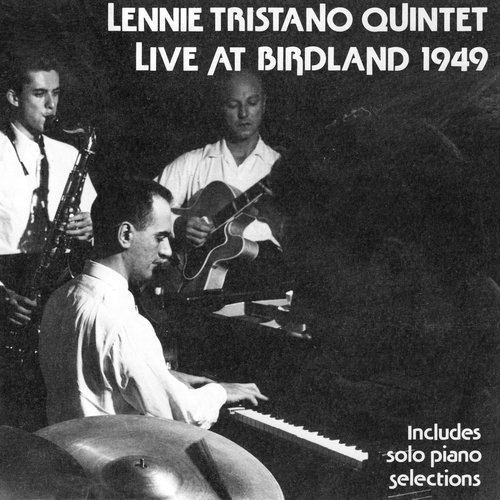
Lennie Tristano - Live at Birdland 1949 (1990)
BAND/ARTIST: Lennie Tristano
- Title: Live at Birdland 1949
- Year Of Release: 1990
- Label: Jazz Records[JR-1CD]
- Genre: Jazz, Bop, Cool
- Quality: FLAC (tracks + .cue,log,scans)
- Total Time: 39:03
- Total Size: 164 MB(+3%)
- WebSite: Album Preview
Tracklist
01. Remember (Tristano) - 7:44
02. Pennies (Tristano) - 5:48
03. Foolish Things (Tristano) - 4:09
04. Indiana (Tristano) - 5:45
05. I'm No Good Without You (Tristano) - 4:24
06. Glad Am I (Tristano) - 3:00
07. This Is Called Love (Tristano) - 2:45
08. Blame Me (Tristano) - 2:46
09. I Found My Baby (Tristano) - 2:42
personnel :
Lennie Tristano - piano
Warne Marsh - tenor saxophone (#1-5)
Billy Bauer - guitar (#1-5)
Arnold Fishkin - bass (#1-5)
Jeff Morton - drums (#1-5)
The name Lennie Tristano was conspicuously absent from Ken Burns' monolithic jazz documentary. That's no small omission; Tristano's group, which included the saxophonists Warne Marsh and Lee Konitz (also ignored by Burns) was the first to record what later came to be known as free jazz -- music improvised without pre-ordained melodies, harmonies, or meter. Needless to say, that wasn't mentioned by Burns, either. Tristano did it in 1949, the year this record was recorded, with what is essentially the same band (Konitz is absent here, though he was a regular member of Tristano's group at the time). This record gives no direct evidence of the band's free jazz experiments -- although Tristano is given composer's credit on all cuts, the disc is comprised mostly of standard harmonic frameworks played without reference to theme. However, it does reflect the band's prevailing emphasis on unfettered linear improvisation. The quintet tracks here were recorded by the group's bassist, Arnold Fishkin, during performances at the old Birdland in New York. The solo piano cuts were recorded in Chicago, four years earlier. The sound's rough, but not unlistenable, especially given the historical implication of the music. Listening to this is like being a fly on the wall of the world's most famous jazz club, witnessing history in the making. It really can't be said that Tristano's piano style was cut from whole cloth -- there's too much of a Bud Powell influence -- but there have been few musicians on any instrument who played with more spontaneous melodic invention. Two others who did were Marsh and guitarist Billy Bauer, also present here; this band placed great importance of creating "in the moment," and listening to this music made over 50 years ago reminds listeners of the value in such an approach. Little jazz being made at the turn of the millennium rivals this set in terms of raw creativity. Popular misconceptions aside, this is an important document.~Chris Kelsey
01. Remember (Tristano) - 7:44
02. Pennies (Tristano) - 5:48
03. Foolish Things (Tristano) - 4:09
04. Indiana (Tristano) - 5:45
05. I'm No Good Without You (Tristano) - 4:24
06. Glad Am I (Tristano) - 3:00
07. This Is Called Love (Tristano) - 2:45
08. Blame Me (Tristano) - 2:46
09. I Found My Baby (Tristano) - 2:42
personnel :
Lennie Tristano - piano
Warne Marsh - tenor saxophone (#1-5)
Billy Bauer - guitar (#1-5)
Arnold Fishkin - bass (#1-5)
Jeff Morton - drums (#1-5)
The name Lennie Tristano was conspicuously absent from Ken Burns' monolithic jazz documentary. That's no small omission; Tristano's group, which included the saxophonists Warne Marsh and Lee Konitz (also ignored by Burns) was the first to record what later came to be known as free jazz -- music improvised without pre-ordained melodies, harmonies, or meter. Needless to say, that wasn't mentioned by Burns, either. Tristano did it in 1949, the year this record was recorded, with what is essentially the same band (Konitz is absent here, though he was a regular member of Tristano's group at the time). This record gives no direct evidence of the band's free jazz experiments -- although Tristano is given composer's credit on all cuts, the disc is comprised mostly of standard harmonic frameworks played without reference to theme. However, it does reflect the band's prevailing emphasis on unfettered linear improvisation. The quintet tracks here were recorded by the group's bassist, Arnold Fishkin, during performances at the old Birdland in New York. The solo piano cuts were recorded in Chicago, four years earlier. The sound's rough, but not unlistenable, especially given the historical implication of the music. Listening to this is like being a fly on the wall of the world's most famous jazz club, witnessing history in the making. It really can't be said that Tristano's piano style was cut from whole cloth -- there's too much of a Bud Powell influence -- but there have been few musicians on any instrument who played with more spontaneous melodic invention. Two others who did were Marsh and guitarist Billy Bauer, also present here; this band placed great importance of creating "in the moment," and listening to this music made over 50 years ago reminds listeners of the value in such an approach. Little jazz being made at the turn of the millennium rivals this set in terms of raw creativity. Popular misconceptions aside, this is an important document.~Chris Kelsey
Jazz | FLAC / APE | CD-Rip
As a ISRA.CLOUD's PREMIUM member you will have the following benefits:
- Unlimited high speed downloads
- Download directly without waiting time
- Unlimited parallel downloads
- Support for download accelerators
- No advertising
- Resume broken downloads



